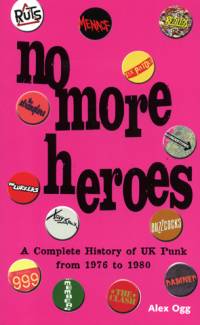'No More Heroes' book
For anyone interested in British Punk between the years 1976 to 1980 then Alex Ogg, a freelance writer who has published several music books, produced No More Heroes in 2006. Note that this is no longer in print but Amazon are selling a Kindle edition on the link given above.
Here's a copy of the press release:
"Punk rock: it's a well-worn subject, but this new book extends the searchlight beyond the King's Road, Roxy and West London - though that crucial scene is by no means neglected. It also encompasses some of the truly fantastic music (and sometimes truly less than fantastic records) that emerged in the wake of the Sex Pistols. The idea has been to give the progenitors their due, but to listen to the reverberations around the UK, from Exeter to Inverness. Participants (musicians, fanzine writers, observers) recount first-hand stories of flea pit gigs, desperately financed singles and local rivalries - punk as it was understood and lived on the ground. The enduring impact of punk belonged to the shires of Britain as well as the celebrated urban gene pool of the capital, where it played out, with a mixture of indomitable personal courage and amoral teenage mischief-making, amongst the alienated of shitsville UK. In the process punk is revealed as a much broader church than other histories have depicted, an entry point for young men and women (and a significant helping of old codgers) from differing backgrounds, with widely ranging sensibilities and aspirations."
 No More Heroes - Alex Ogg"The book assesses each of the major 'punk artists', candidly, on their output, following their development to the present day. There's an effort to redress perceived wisdom about the value of those careers as the 70s turned into the 80s, when many of the original punk bands actually made their best records. While many names will be familiar others will not. Hence time is devoted to punk's splintered personality post-1977. From those bands that took it as an inviolate template, to those who embraced it as a rebirth for the original spirit of rock 'n' roll to those, finally, who judged it the end of rock music and a jumping off point for something completely new. There is no unifying view or theory behind these accounts, instead the book serves as an attempt to capture the beautiful chaos engendered by competing voices as the walls came tumbling down. The idea is to be inclusive and celebratory rather than cynical. Therefore opinions are sought from outside the tight huddle of usual suspects and would-be elitists, drawing on bemused and bewildered non-participants to events, as well as those who served in the trenches. There is no attempt to locate the 'meaning' of punk, nor to run a slide rule over qualifications for its status. The author has instead, in the majority of cases, let the protagonists make their own cases. Where possible the bands concerned have exercised the right of reply, leading to a more balanced account of their own history. Some 200 interviews were completed in the course of researching the book, leading to a plethora of first-hand insights and anecdotes."
No More Heroes - Alex Ogg"The book assesses each of the major 'punk artists', candidly, on their output, following their development to the present day. There's an effort to redress perceived wisdom about the value of those careers as the 70s turned into the 80s, when many of the original punk bands actually made their best records. While many names will be familiar others will not. Hence time is devoted to punk's splintered personality post-1977. From those bands that took it as an inviolate template, to those who embraced it as a rebirth for the original spirit of rock 'n' roll to those, finally, who judged it the end of rock music and a jumping off point for something completely new. There is no unifying view or theory behind these accounts, instead the book serves as an attempt to capture the beautiful chaos engendered by competing voices as the walls came tumbling down. The idea is to be inclusive and celebratory rather than cynical. Therefore opinions are sought from outside the tight huddle of usual suspects and would-be elitists, drawing on bemused and bewildered non-participants to events, as well as those who served in the trenches. There is no attempt to locate the 'meaning' of punk, nor to run a slide rule over qualifications for its status. The author has instead, in the majority of cases, let the protagonists make their own cases. Where possible the bands concerned have exercised the right of reply, leading to a more balanced account of their own history. Some 200 interviews were completed in the course of researching the book, leading to a plethora of first-hand insights and anecdotes."
"A secondary aspect of the book is the comprehensive documentation of the releases, both contemporary and retrospective, of the bands of the era. It's an attempt to address the jungle of retrospective CDs and box sets, the sheer volume of which indicates the continued fascination around this period in British musical history."
The book contains:
- Over 300 individual band/artist biographies
- Use of several unpublished photos
- Forewords by Captain Sensible and David Marx
- Complete discographies featuring capsule reviews and source notes
What's more important, of course, is that the book mentions the Toads - fame at last!

